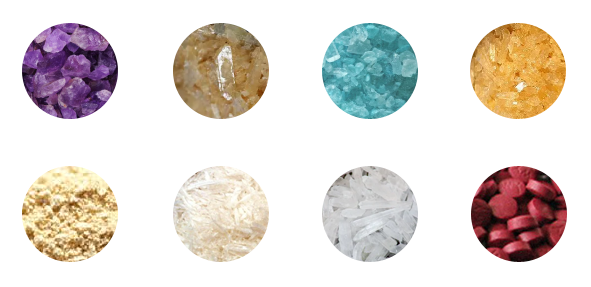Recognize the Signs
How to Spot Meth Use
How do you know if someone you love may be using meth? Here are some tell-tale signs of symptoms of meth use and addiction:
Physical Symptoms
- Dilated Pupils
- Rapid Eye Movement
- Grinding Teeth
- Loss of Appetite
- Facial Tics
- Twitching or Jerking
- Restlessness
- Weight Loss
- Excessive Scratching
- Picking at Skin or Hair
- Irregular Heartbeat
- Nausea or Vomiting
- Excessive Sweating
Behavioral Changes
- Requesting to Borrow Money
- Selling Possessions
- Stealing
- Disregard for Personal Appearance
- Not Sleeping for Days or Weeks
- Aggressive or Irritable
- Violent Mood Swings
- Persistent Need to Talk
- Confusion or Memory Loss
- Paranoia
- Change in Academic Scores
- Compulsive Lying
Evidence
Meth can be taken orally, smoked, snorted, or injected.
- Lighter
- Glass Pipe
- Burned Foil
- Light Bulbs
- Short Straw
- Hollowed-Out Pen
- Glass Tube
- Spoon
- Syringe
- Tourniquet
Did you know?
Meth releases 12x more dopamine into your body than either food or sex. That makes it highly pleasurable and highly addictive. Meth is 3x more addictive than cocaine and nearly impossible to quit without professional help.
Common street names from meth include: Bump, Chalk, Cookies, Cotton Candy, Crank, Crystal, Glass, Ice, Pookie, Quartz, Rocket Fuel, Speed, Shards, Scooby Snax, Tina, Trash, Tweak, Uppers, Wash, White Cross
Meth comes in many forms (powder, crystal, rock, tablets) and colors (depending upon how it was made).

What can you do to help?
- Talk to your children and family members about the risk and dangers of meth use.
- Monitor the use of pseudoephedrine (cold medicine) in your home.
- Refuse to purchase pseudoephedrine for another person.
- Share your message about meth and join the conversation.
- Get involved with our campaign.
If you see suspicious activity, call the law enforcement's drug tip line at 715-944-3749.
Where to Turn for Help
One person can change a life.
Substance Abuse and Mental Health Services Administration (SAMHSA) National Helpline:
1-800-662-4357
LE Phillips Libertas Treatment Center
2661 Cty Hwy I | Chippewa Falls | 715-723-5585
Chippewa Area Recovery Resource (CARR)
127 W Central St | Chippewa Falls | 715-726-9023